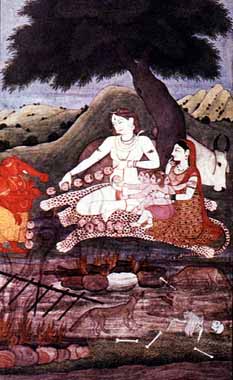 |
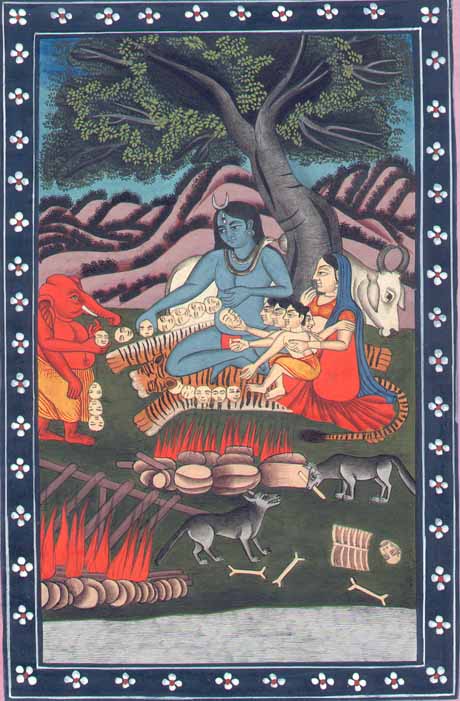 |
 |
 |
Shiva and family picnic beside a burning-ground, stringing severed heads into a garland, 1790 and 2001
LEFT IMAGE:
Source: http://alaike.lcc.hawaii.edu/sg/hinduism/23hin_top_l.html
(downloaded Oct. 1999)
"Shiva and Parvati on a picnic: she holds Kartikkeya, while Shiva and Ganesh string together skulls into a garland. Kangra painting, 1790, from the Victoria and Albert Museum, London."
RIGHT IMAGE (a modern painting based on the earlier one):
Source: http://www.exoticindiaart.com/paintings/SH56
(downloaded June 2001)
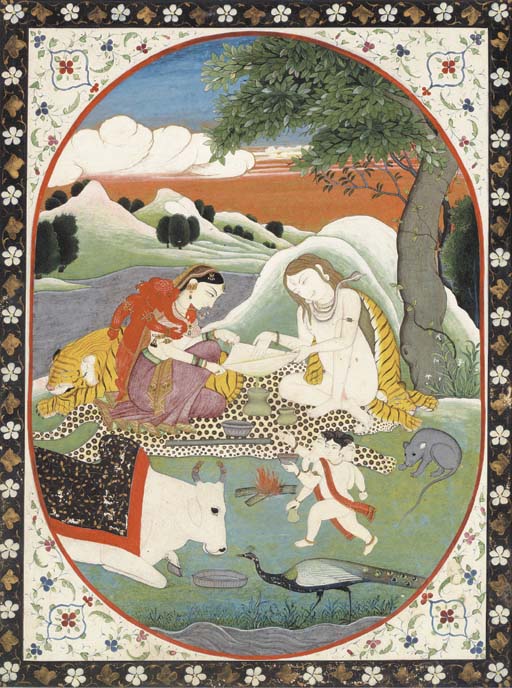
Shiva and family, c.1810-20, Guler or Mandi style: Shiva and Parvati strain bhang for drinking
Source:
http://www.christies.com/LotFinder/search/LotDetail.asp?sid=&intObjectID=3879100&SE=CMWCAT04+219932+%2D1745476843+&QR=M+1+115+Aqc0000900+204173++Aqc0000900+&entry=india&SU=1&RQ=True&AN=116
(downloaded Mar. 2002)
"India, Himachal Pradesh, Guler or Mandi, attributed to Sajnu, circa 1810-20. A Domestic Scene of Shiva and Parvati with Family. The scene by a riverbank with rolling hills in the background very finely painted with Parvati and Shiva seated on a leopard skin and resting against a sleeping tiger, holding a cloth sieve separating bhang in a pot, with Ganesha delightfully hugging his mother's shoulders and suckling from her breast and Karttikeya at front holding two vessels, the family surrounded by the bull Nandi, Ganesha's rat and Karttikeya's peacock, framed in an oval panel with floral sprays against a white ground and dark floral outer border. Image: 8 x 6 in. (20 x 15 cm.).
Lot Notes: Scenes of the Holy Family in domestic bliss were a
popular theme with Pahari painters. In these scenes, Shiva is
transformed and humanized from the wild ascetic to a doting
husband and father though still retaining trappings of his divine
status. According to W.G. Archer, Indian Paintings from the Punjab
Hills, 1973, vol. 1, pp. 361-66, Sajnu, native to Guler, left his
Kangra patron, Sansar Chand, and came to work for Raja Isvari Sen
of Mandi in 1808 after turmoil forced him from the Kangra kingdom.
The distinct painting modes of the three regions culminate in this
and the following lot. The oval format, decorative floral borders
and flowing line are elements of the Kangra style that came into
vogue in the latter 18th century, influenced from Mughal court
painting. Guler style is exemplified by the jagged abstract rock
formations, delicate palette, and geometrical compositions that
Archer states "at times violates realism for the sake of geometric
drama." Mandi ruler Raja Isvari Sen, as a devout follower of
Shiva, provided the impetus for these commissions."
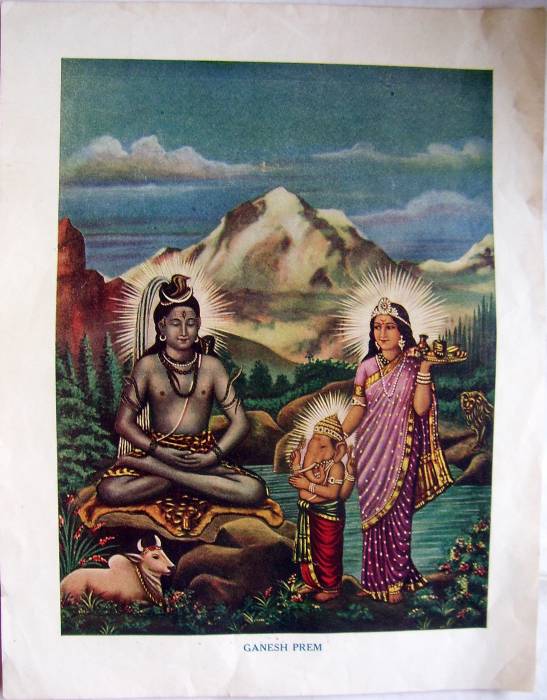
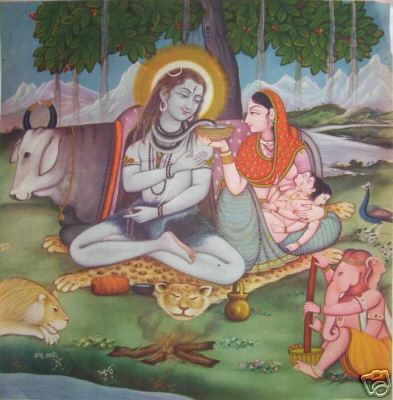
Parvati serves milk to Shiva's cobra (bazaar art, c.1980's); *another modern version*
Source: ebay, Nov. 2007
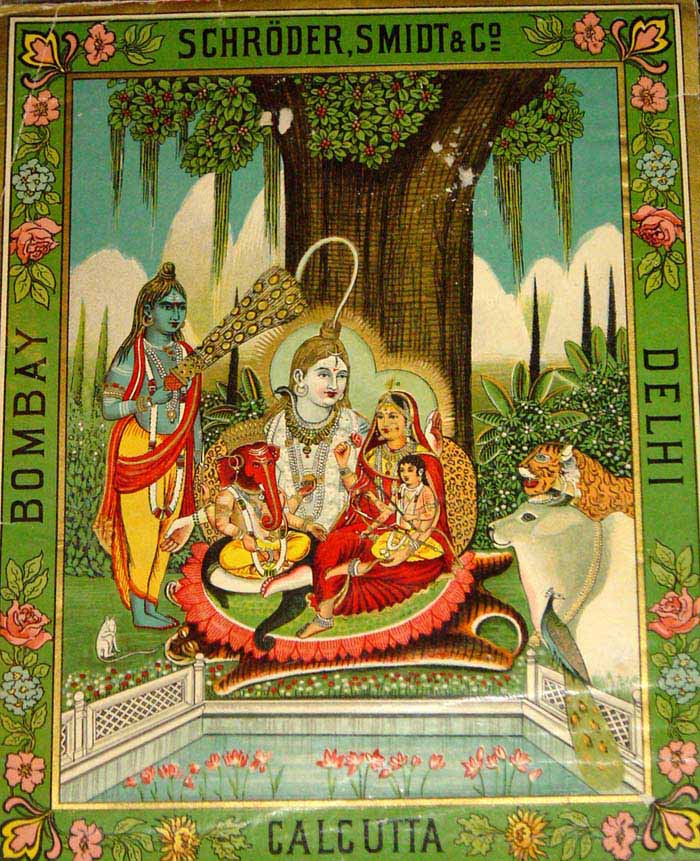
Shiva and family: here the picnic scene becomes a Mughal-style garden, with no skulls or bhang (textile label, early 1900's)
Source: ebay, Nov. 2003
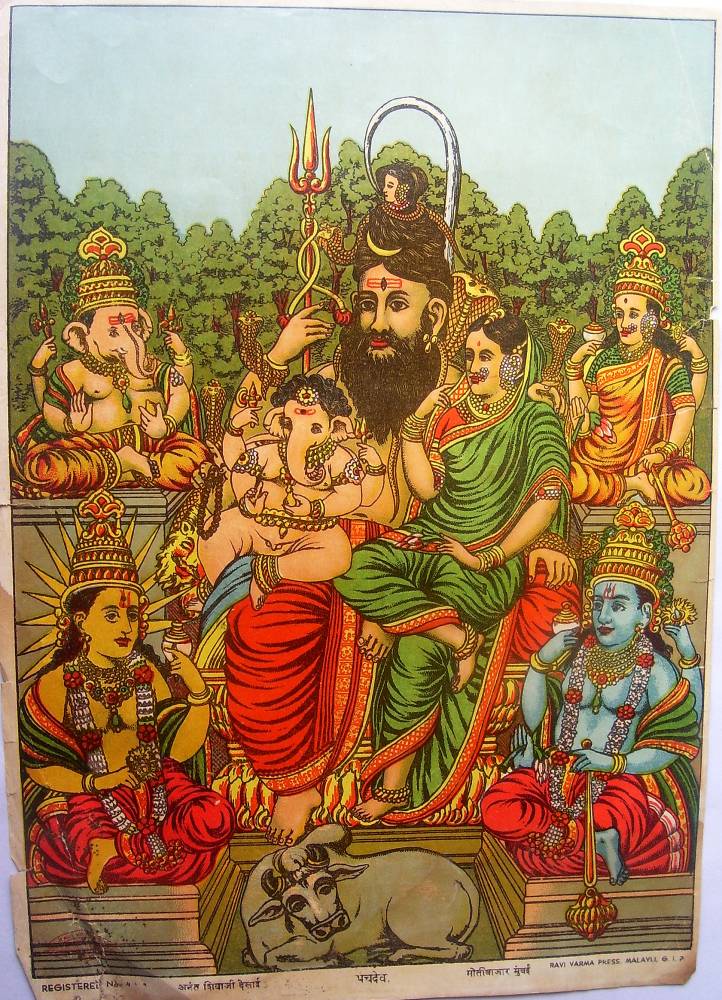
"Panch dev" (five gods), from the Ravi Varma studio, 1910's; *a version of the print adorned with real sequins*
Source: ebay, Oct. 2008
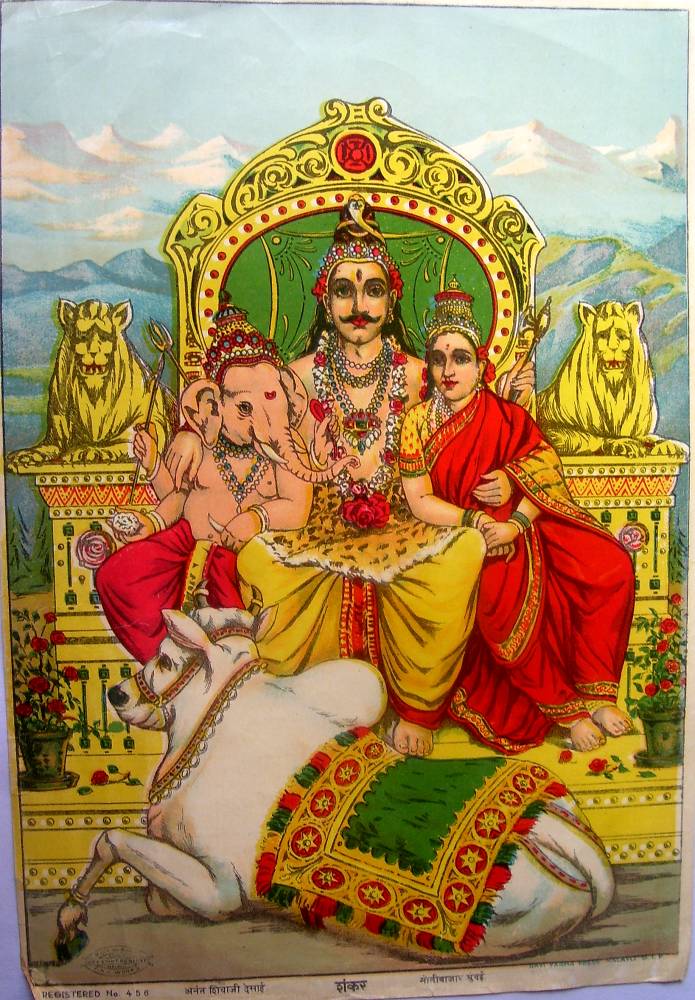
A version from the Ravi Varma press: "Shankar," c.1920's; *a very large scan of a version from the 1910's*; *a later version of the same popular print*; *an earlier version by Raja Ravi Varma himself*
Source: ebay, Mar. 2006
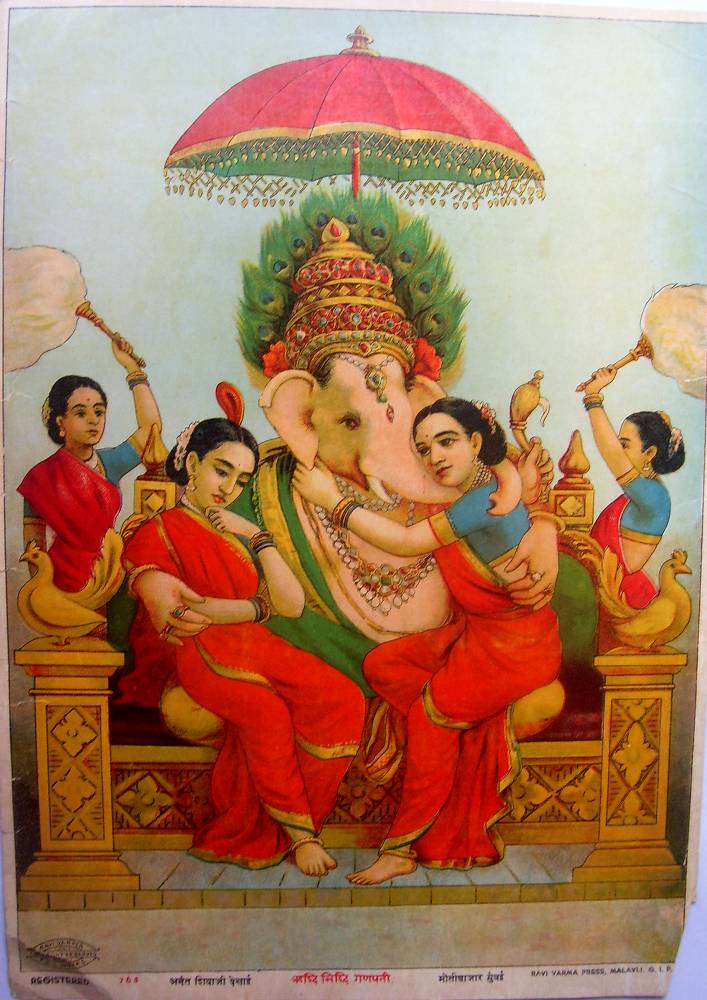
*Shiva and Parvati pose for a formal portrait (bazaar art, 1940's)*
Source: ebay, Nov. 2006
*Another view of the ascetic Shiva and the well-dressed Parvati (bazaar art, c.1950's)*
Source: ebay, Nov. 2006
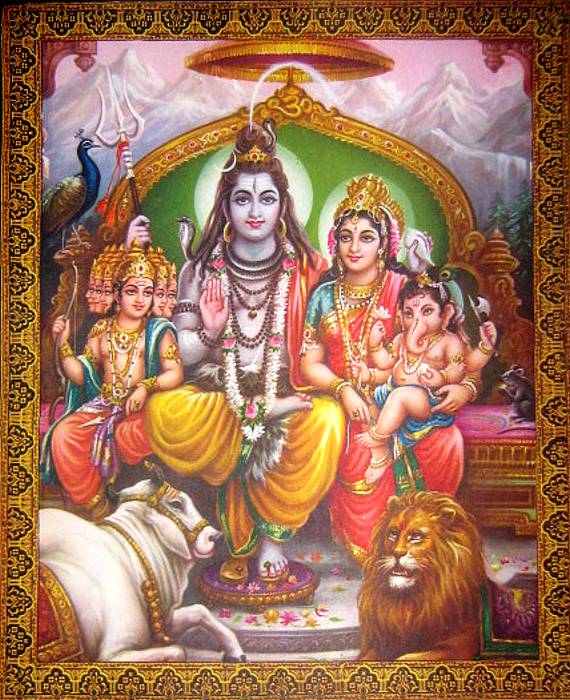
The most elaborate family portrait; bazaar art, c.1970's (a tiger or lion is Parvati's vahana); *another such view*
Source: ebay, Nov. 2007
|
|
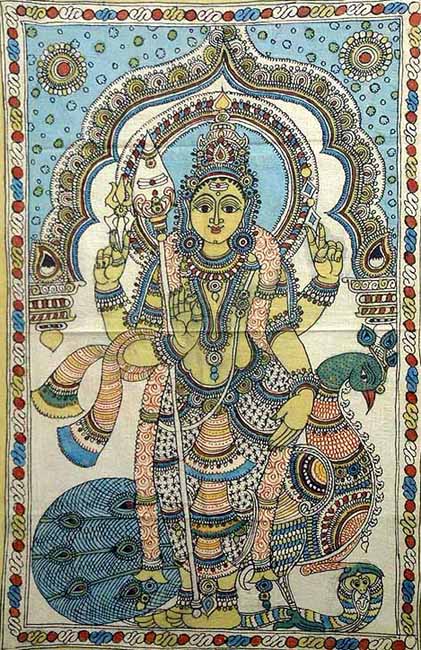 |
Source: ebay, Dec. 2007; and
http://www.exoticindia.com/product/PB80/ (downloaded Sept. 2008)

A family portrait, bazaar art, c.1980's, in which two figures have four arms, two have two arms; *another such view*
Source: ebay, Sept. 2008
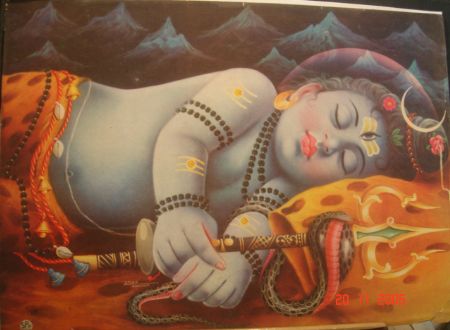
Shiva can even be depicted as an adorable child (modern bazaar art)
Source: ebay, Jan. 2006
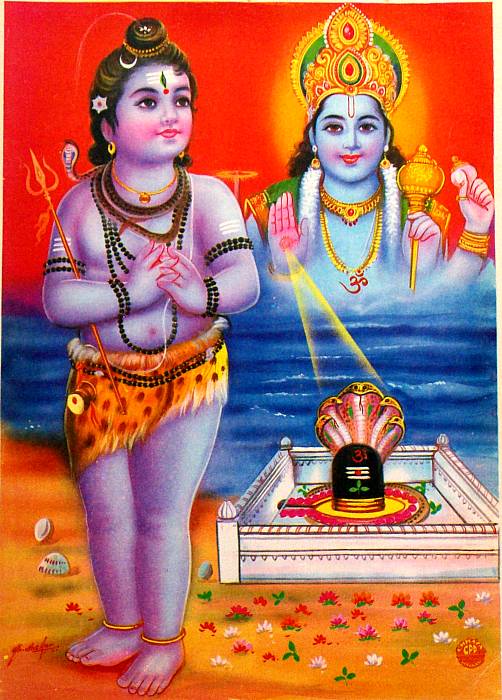
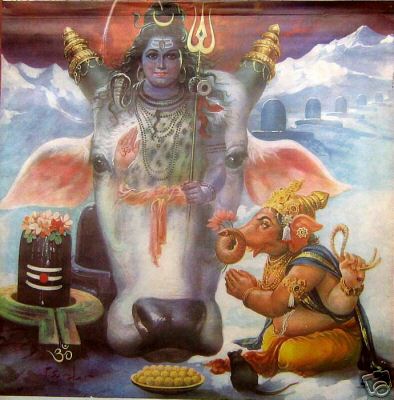
Here, Shiva seems to merge into the form of Nandi as Ganesh meditates on him (bazaar art, c.1980's); he can also appear *as a conch shell*
Source: ebay, Sept. 2007

A religious poster that depicts Shiva's family history (c.1940's)
Source: ebay, Oct. 2006
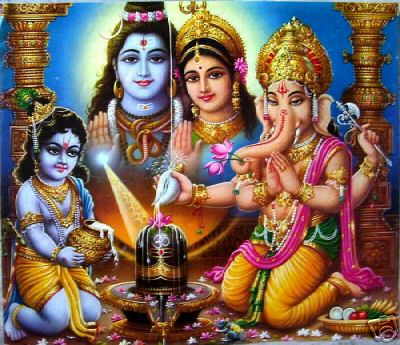
The child Krishna joins the family in honoring the lingam (bazaar art, c.1980's)
Source: ebay, Oct. 2007
== Indian Routes index == Indian Routes sitemap == Glossary == FWP's main page ==